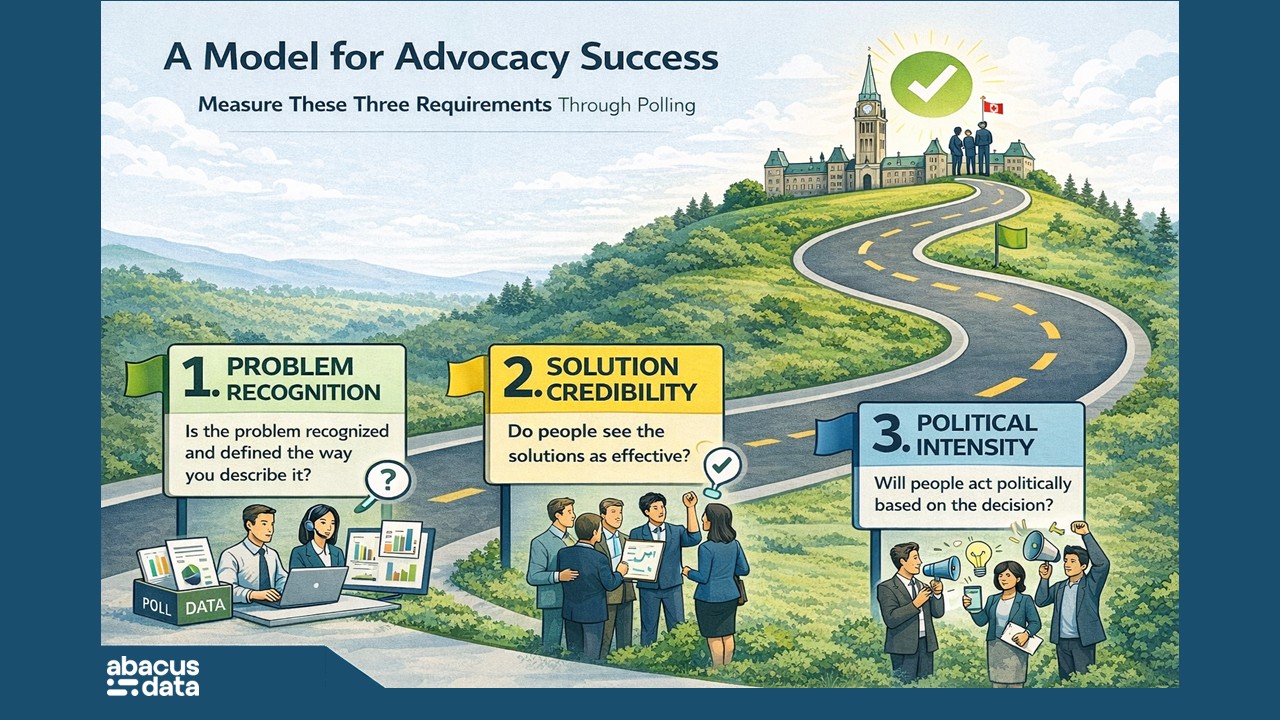Building a Future-Ready Ontario: How Colleges Can Help Protect Jobs and Strengthen Communities
November 21, 2025
Recently, Abacus Data partnered with Colleges Ontario to better understand how Ontarians feel about the future of work, the economy, and the role colleges play in preparing people for change.
Ontarians are increasingly anxious about their future. Rising costs, job insecurity, and rapid technological change have created a precarity mindset – a feeling that stability can no longer be taken for granted. People want to know there’s a plan to help them adjust and thrive.
Premier Doug Ford’s promise to “protect Ontario” has resonated because it speaks to that desire for security. But in a world defined by disruption, protection now means more than defending what exists – it means preparing Ontarians for what comes next.
This research explores that tension: a province where people believe change is inevitable, yet remain unsure whether they – and their government – are ready for it. It reveals broad confidence in Ontario’s colleges as the engine of a future-ready workforce, and a growing sense that renewed partnership and investment will be essential to delivering on the shared goal of protecting Ontario’s future.
Ontarians Feel the Pressure of Change and the Need to Adapt
A growing majority of Ontarians are anxious about the province’s economic future and their place within it. Three in four Ontarians (74%) believe Ontario will face widespread job losses over the next five years, driven by economic shifts, automation, and global competition. This concern cuts across political lines – shared equally by Conservative, Liberal, and NDP supporters. While younger Ontarians (18–29) are slightly less pessimistic, nearly two-thirds (63%) still see job losses as likely, underscoring a shared unease about what lies ahead.
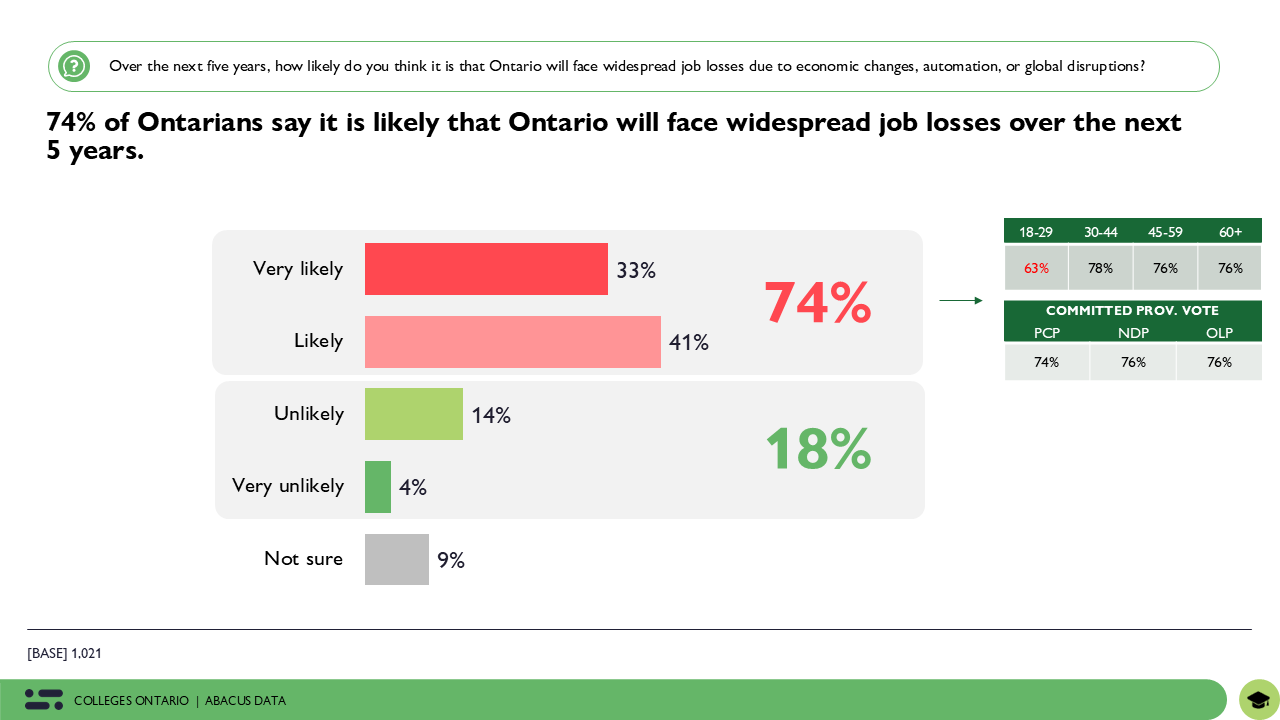
Further, more than half (55%) of Ontarians express at least moderate concern about the security of their own job or employment situation. Those aged 30-44 are particularly uneasy (65%), likely reflecting the pressures facing mid-career workers balancing family, mortgages, and uncertain employment prospects.

As workers navigate a shifting economy, many recognize the need to adapt: nearly two-thirds (63%) expect they will need to retrain within the next five years to remain competitive. For younger and mid-career Ontarians in particular, the pressure to reskill is already clear as 75% of those aged 40–44 and 71% of those aged 18–29 anticipate the need to learn new skills to keep pace with change.
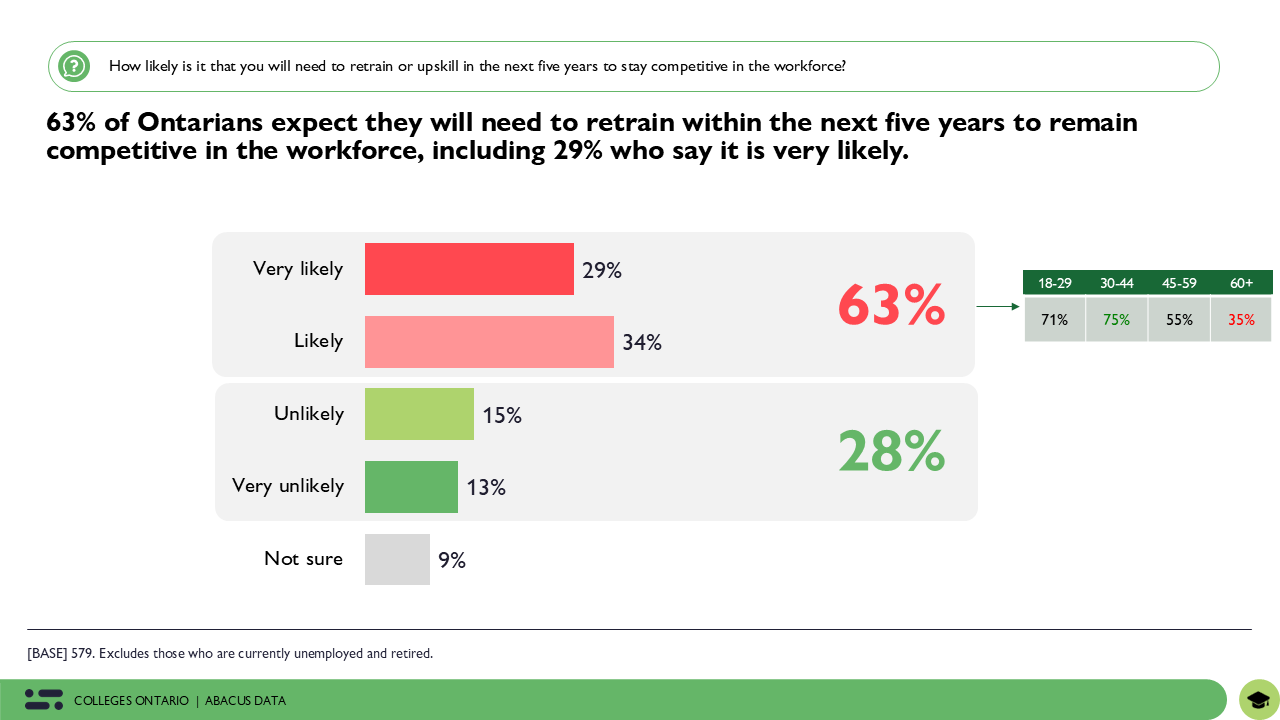
The Role of Colleges in Ontario’s Workforce Future
Ontarians see colleges as central to building the province’s economic strength and resilience. They view the college system as where practical skills meet real-world opportunity – institutions that prepare the health care professionals, tradespeople, and technicians Ontario needs today, while developing the skilled talent that will drive growth tomorrow. Colleges are also seen as key to training workers for emerging and in-demand sectors such as green technology, energy, mining, advanced manufacturing, and sustainability-focused industries, areas critical to Ontario’s long-term competitiveness. In fact, Colleges supply more than half the workforce in sectors such as health care, mining, energy, and advanced manufacturing, supporting Ontario’s economy and communities.
By contrast, universities are viewed as engines of research and innovation, specializing in scientific and technical expertise that advances discovery and global competitiveness. Together, with colleges role in applied research and innovation, both systems play distinct but complementary roles. But it is Ontario’s colleges that most Ontarians see as the foundation for a workforce ready to meet the challenges of change – adaptable, skilled, and prepared for the future.
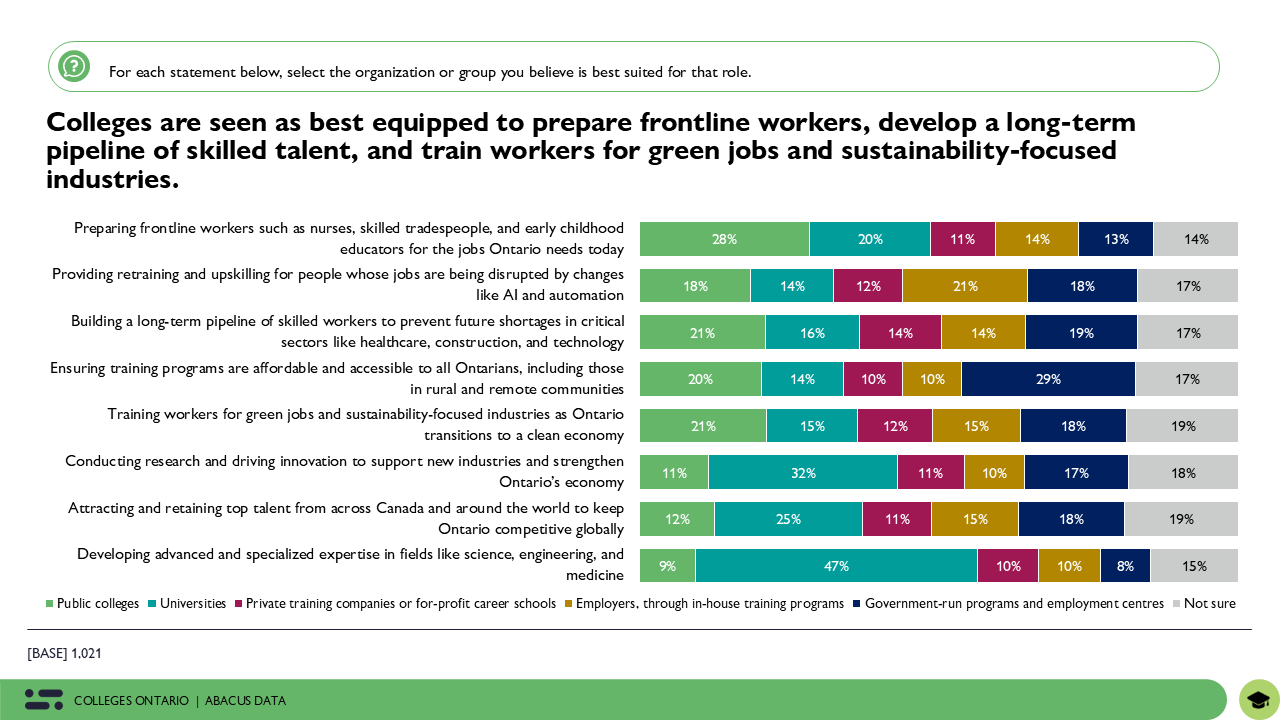
The Cost of Inaction: What’s at Stake Without Increased College Funding
Ontarians are clear: if colleges are not given the resources to grow and modernize, the province’s economic future is at risk. Nearly eight in ten (78%) say that without expanded and updated college programs, Ontario could struggle to develop the skilled workforce needed to compete and deliver essential services. This concern spans political lines and grows stronger with age, reflecting an understanding that the province’s prosperity depends on keeping its talent pipeline strong.
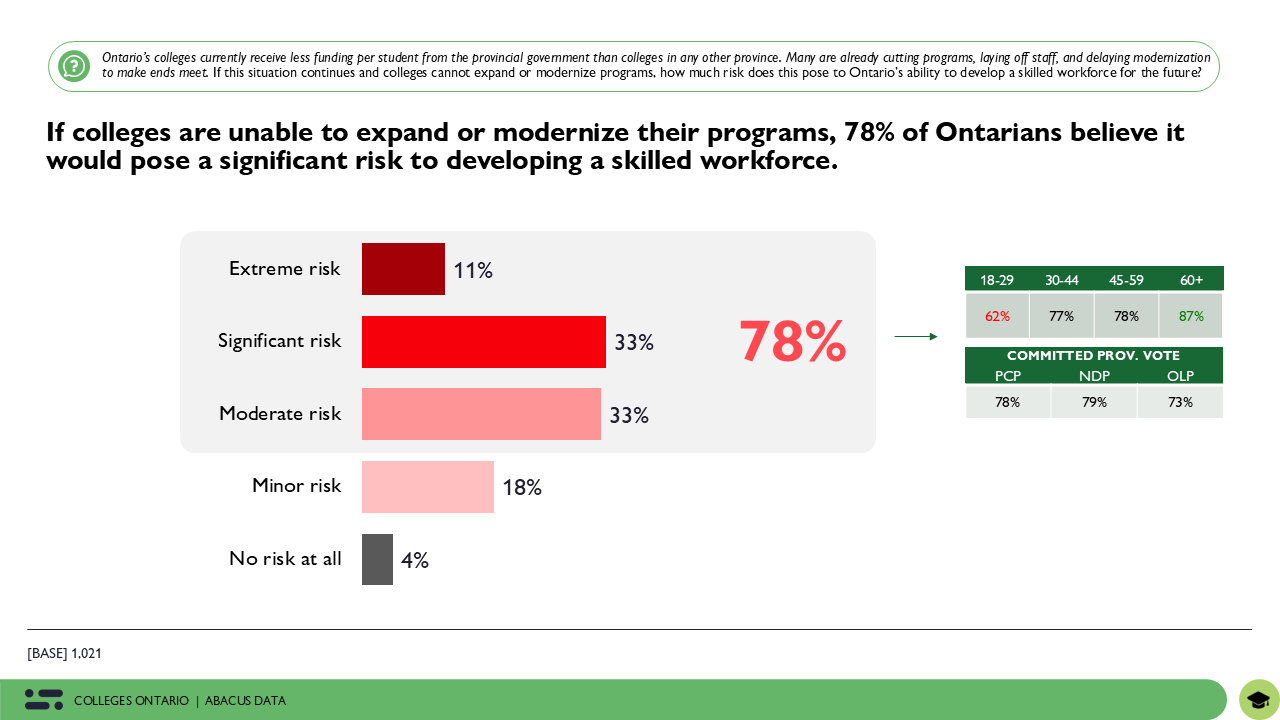
If funding remains stagnant, Ontarians foresee a province that begins to fall behind. Many believe young people will leave Ontario in search of better opportunities, that fewer graduates will enter the skilled trades, and that the overall quality of training programs and public services will decline. Others fear broader ripple effects – fewer local job opportunities, higher unemployment, and growing reliance on immigration to fill critical workforce gaps.
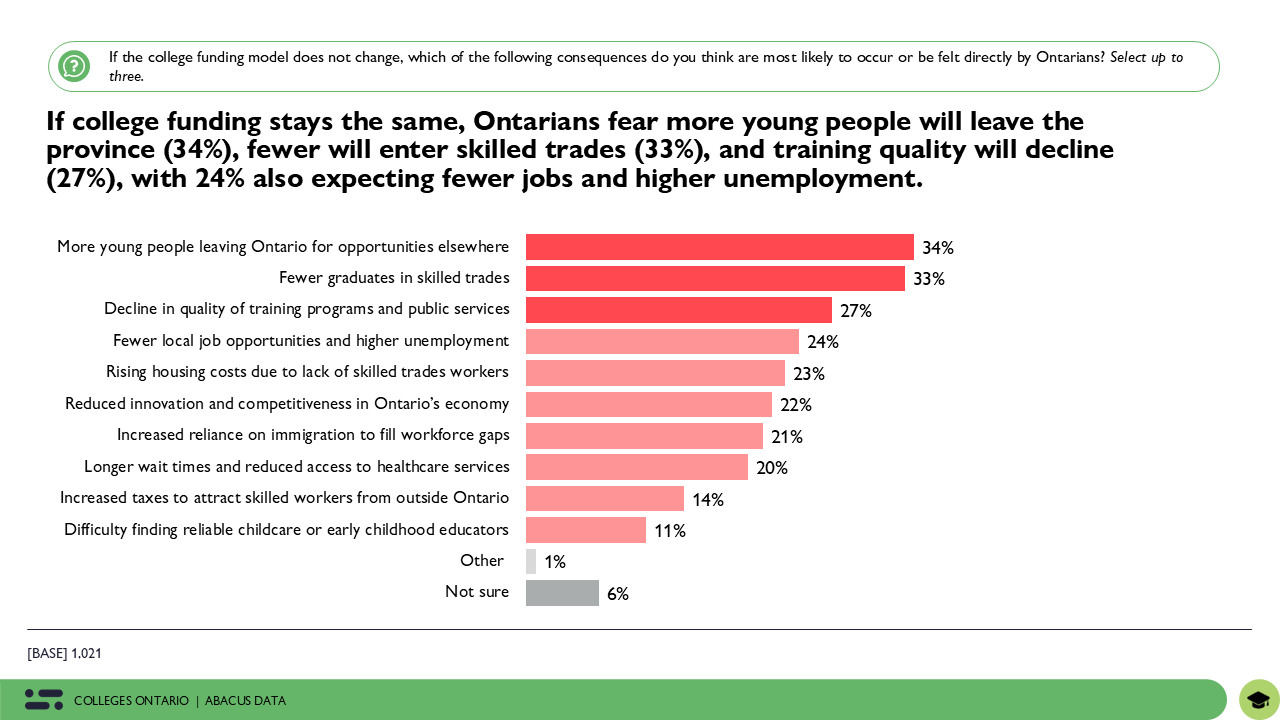
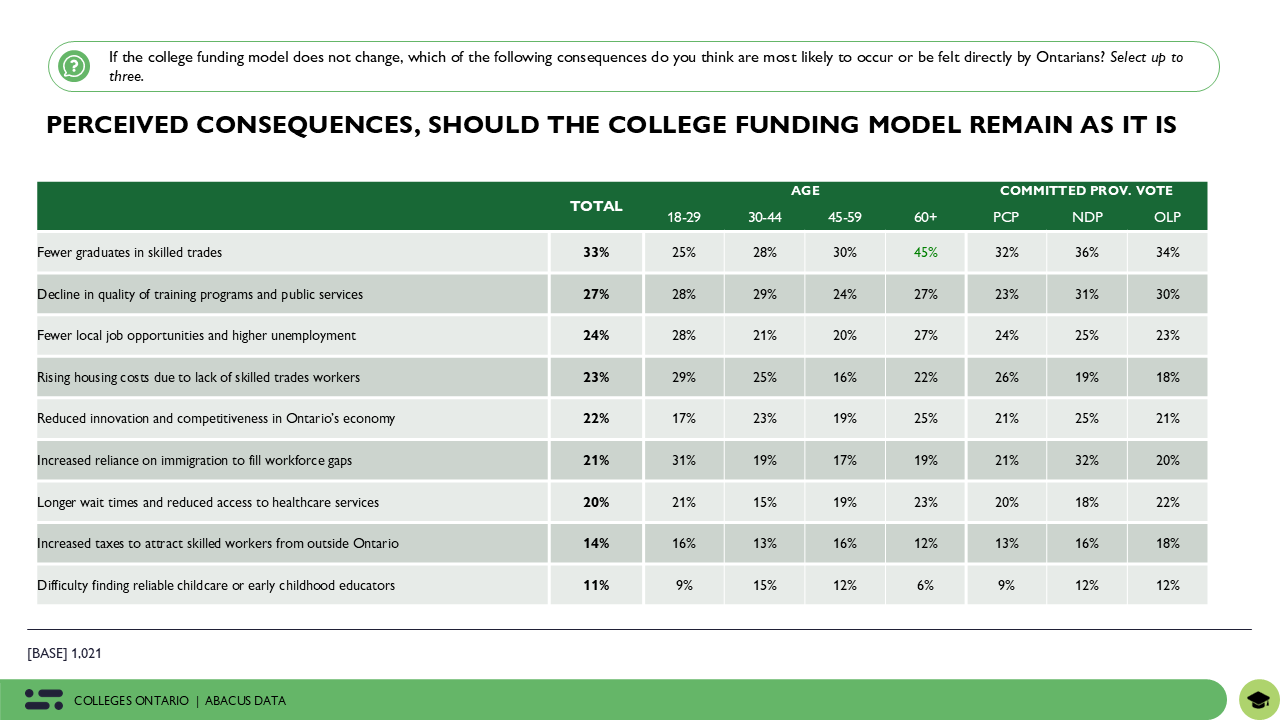
Health care, skilled trades, and manufacturing are seen as the sectors most at risk if colleges cannot keep pace with workforce needs. For Ontarians, the message is clear: ensuring that colleges have the funding to expand, modernize, and adapt isn’t just an education issue – it’s an economic imperative.
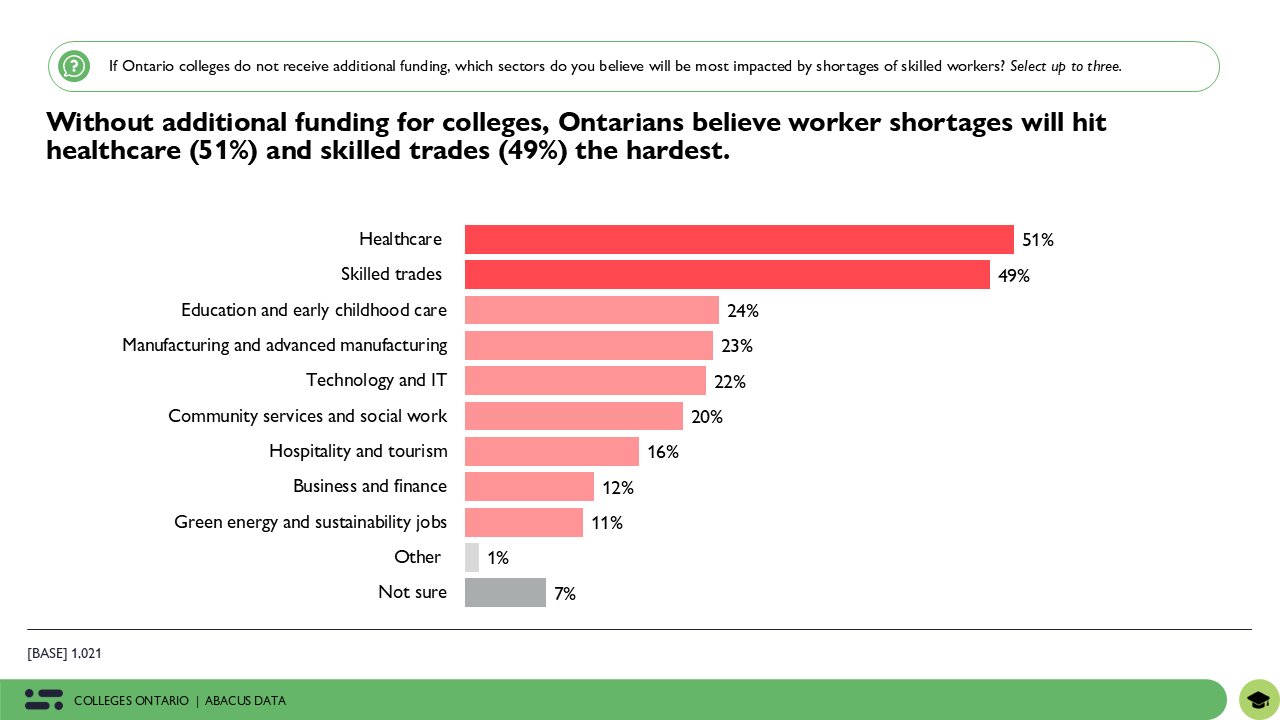
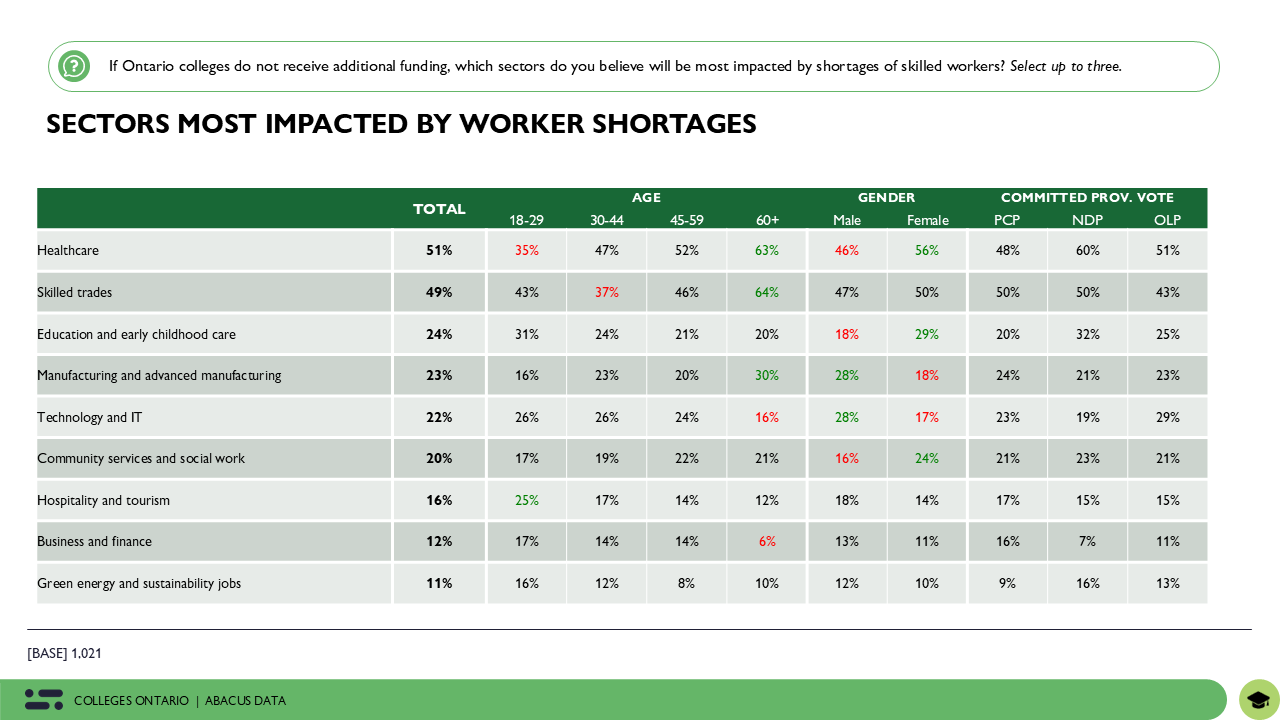
A Call to Invest in Ontario’s Future
Ontarians overwhelmingly agree that post-secondary education is essential to safeguarding the province’s future. More than eight in ten (82%) see the system as critical to protecting the province’s long-term prosperity. This belief is consistent across party lines, with 80% of Conservative supporters, 86% of NDP supporters, and 81% of Liberals in agreement. Older Ontarians are especially emphatic, with 88% of those aged 60 and over recognizing the importance of post-secondary education, while strong majorities of younger residents (75% of 18–29 and 78% of 30–44) share that view.

The urgency to act is nearly as universal. Seven in ten Ontarians (71%) say it is at least moderately urgent for the provincial government to increase funding for colleges to help prepare workers for a future shaped by artificial intelligence, automation, and global trade disruptions. Again, there is strong consensus across political lines – 72% of Conservatives, 76% of NDP supporters, and 72% of Liberals agree that action is needed. While older Ontarians feel this most strongly (79% of those 60+), even among the youngest adults, six in ten (60%) recognize that the time to invest is now.
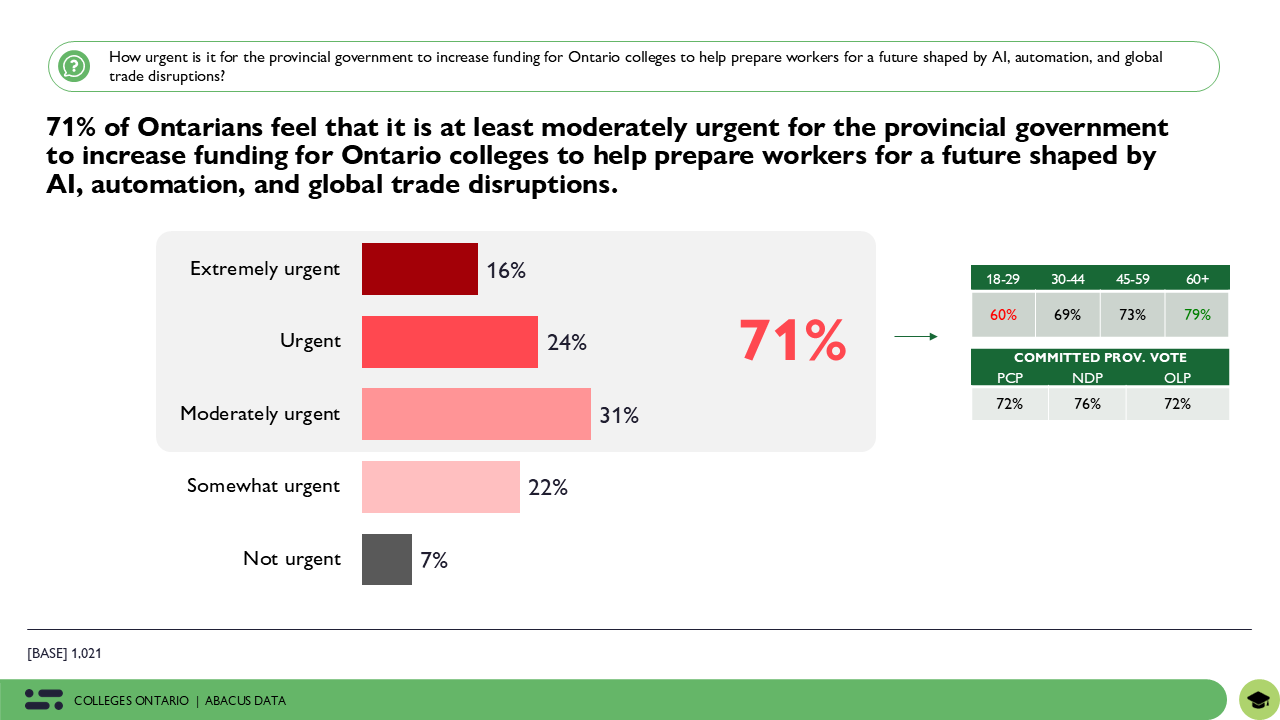
For Ontarians, the conclusion is clear: protecting Ontario’s future means investing in its people. Without renewed funding and strategic investment in colleges, the province risks not just a skills shortage, but the erosion of opportunity, innovation, and long-term growth.
The Upshot
What emerges from this data is not just concern – it’s a deep, pervasive sense of precarity among Ontarians. People feel the ground shifting beneath their feet. They see technological change, global competition, and an uncertain economy threatening their stability, and they’re looking for institutions that can help them adapt and rebuild their sense of security. Colleges sit at the centre of that story. They are the bridge between anxiety and opportunity – between the fear of losing one’s place in the economy and the confidence of knowing there’s a path forward.
For the Ford government, this moment offers an opportunity to expand on its promise to protect Ontario. Protection in today’s economy means more than defending what exists – it means preparing people to succeed in what’s next. Strengthening the college system is a tangible way to do just that: to build a workforce ready for the jobs of tomorrow, to give communities the confidence that opportunity still exists close to home, and to ensure Ontario remains a place where people can build stable, rewarding lives.
Ontarians already believe in the value of their colleges. What they’re looking for now is leadership that turns that belief into action – through renewed investment, modernized training, and a clear plan for the future of work. By investing in people and in the institutions that prepare them, Ontario can transform uncertainty into strength – and truly deliver on the promise of protecting Ontario’s future.
Methodology
The survey was conducted with 1,021 Ontarian adults from September 12 to 17, 2025. A random sample of panelists were invited to complete the survey from a set of partner panels based on the Lucid exchange platform. These partners are typically double opt-in survey panels, blended to manage out potential skews in the data from a single source.
The margin of error for a comparable probability-based random sample of the same size is +/- 3.07%, 19 times out of 20.
The data were weighted according to census data to ensure that the sample matched Canada’s population according to age, gender, educational attainment, and region.
This survey was paid for by Colleges Ontario
Abacus Data follows the CRIC Public Opinion Research Standards and Disclosure Requirements that can be found here: https://canadianresearchinsightscouncil.ca/standards/
About Abacus Data
We are the only research and strategy firm that helps organizations respond to the disruptive risks and opportunities in a world where demographics and technology are changing more quickly than ever.
We are an innovative, fast-growing public opinion and marketing research consultancy. We use the latest technology, sound science, and deep experience to generate top-flight research-based advice to our clients. We offer global research capacity with a strong focus on customer service, attention to detail, and exceptional value.


